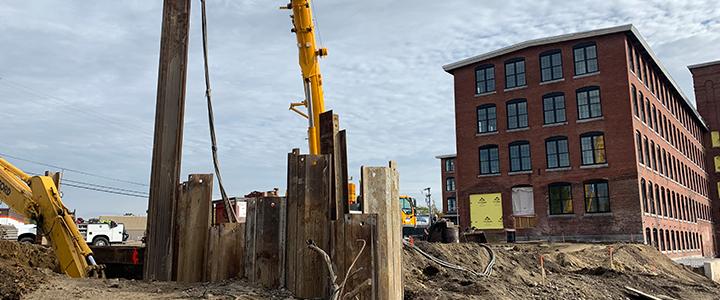
Revitalizing 'Shoe City’s' Past
The Factory on Willow, LLC took ownership of a former shoe manufacturing factory in Manchester, in 2018 and, along with environmental consultant GZA GeoEnvironmental, Inc. (GZA) and NHDES, has made considerable strides toward cleaning up one of the state’s oldest legacy petroleum-contaminated sites. The company obtained the site with the vision to develop it into a collaborative space to live, work and play.
The Factory on Willow, built in 1880, first operated as McElwain Shoe Company’s Cohas Factory and later as Johnson Shoe Company. The site was used for manufacturing shoes until 1972, contributing to the “Shoe City” nickname of Manchester’s past.
Historically, during its shoe manufacturing days, the building was converted from coal to fuel oil supplied from underground storage tanks. In the 1970s, leaks from a tank were discovered and monitoring of the site conditions began. However, the leaking tank, having released an estimated 200,000 gallons of fuel oil, was located under a building addition and contaminated soil could not be easily removed. Over the years, remediation efforts at the site have included installing wells to recover oil from the ground, but no large-scale excavation had been conducted because of the leaking tank’s location.
With the plans for The Factory on Willow redevelopment taking shape in 2019, the project team, including GZA, saw an opportunity to take advantage of the planned renovations and applied for funding through the NHDES Petroleum Reimbursement Fund to initiate an ambitious soil excavation project. The redevelopment plans included removing the building addition over the leaking tanks, which allowed access to the contaminated soil for removal. Russ Lagueux, the NHDES project manager, stated, “For nearly 50 years, soil and groundwater at the property has been negatively impacted from heating oil that leaked from the tank. The redevelopment of the site by The Factory on Willow group provided an opportunity to access the contamination and remove it in conjunction with the redevelopment work.”
Shallow soils that were not contaminated with petroleum were excavated and staged on site for reuse as backfill. The petroleum-contaminated soil, more than 5,000 tons, was excavated and transported off site for thermal treatment recycling. Once excavation advanced below the water table, groundwater was pumped from the excavation to allow excavation in the dry. Over 600,000 gallons of water were pumped to an on-site activated carbon treatment. Excavating up to 23 feet below ground adjacent to the historic brick building required braced sheet piles to support the excavation and real-time settlement and vibration monitoring of the building.
The Factory on Willow is currently in the final stages of redevelopment and leasing is underway. In the end, the extensive improvements to the building and the remediation in the ground are providing this central Manchester neighborhood a revitalized community space at a former shoe manufacturing property. The Factory on Willow’s Elizabeth Hitchcock remarked, “Projects like these highlight the potential for the south end of Elm Street and while the environmental mitigation is daunting, GZA was quick to answer our questions and were great partners.”




